#conservative christianity
Text
Here’s a reminder for anyone who thinks that conservatives accept aces: they think we need to be fixed. They think women and feminine people are inherently asexual but they mean it in a way that agency is removed, not as an orientation.
It’s also not a sudden switch. The churches I grew up in preached that sexuality was reserved for your husband, and that if you had boobs (they didn’t recognize anything but cis existed) that your body was inherently tempting, and men’s attraction to you was your responsibility.
Also — while I went to church camp every summer and did Bible Quizzing (I was really good at that actually) and was in the church pageant and youth groups and all of that — I know many people raised in much stricter churches, and that includes stricter purity culture beliefs.
The idea that men and masculine people wouldn’t want sex? Utterly unthinkable. I even remember having conversations in my Christian college with women who wanted to get married who said that part of their marriage was the duty to be sexually available to their husbands.
The body I was raised with was meant for the service of a future husband, not me. And that bled into secular culture (still does). Claiming my aceness was a huge part of claiming agency over my body and healing from the idea that it could only exist for others.
Here’s the thing: in a nutshell, women and feminine people are seen as not wanting sex, but having bodies inherently sexually tempting to men and masculine people. When the two marry, she must give her body to her husband in every way. And yeah, it’s as gross as it sounds.
Just because conservatives didn’t say “asexual” before doesn’t make this rhetoric new. Purity culture has been against anything not based in some 1950s idealized sexuality in marriage for a very long time. Very cis heteronormative— two things aces are not. The only difference is that conservatives are including the word “asexual” in their sexual ethics now.
Wrote an essay about it here.
But yeah it’s not new. They’re just learning how to use more vocabulary to say what they were already saying.
#lgbtqia#conservatism#conservatives#purity culture#conservative christianity#queer#asexuality#demisexuality#graysexual#asexual#demisexual#graysexuality#gray ace#text#acephobia#acemisia
2K notes
·
View notes
Text
If we go with the concept that magic in bbc merlin is a metaphor for homosexuality, Arthur is that child from an abusive christian conservative family who was taught about it being a horrible sin his whole life. And who really only needed to be shown enough positive examples.
#merlin bbc#bbc merlin#arthur pendragon#uther pendragon#magic as a metaphor#queer metaphor#and arthur is a christian kid#i'll die on this hill#queerness#homophobia#conservative christianity
48 notes
·
View notes
Text
Half a year ago, I got myself involved in a thread which compared trans rights to gay rights and tried to make a case that, in terms of arguments for each, the issues are not as directly comparable as a lot of people seem to think. A lot of my perspective comes from a sort of an empathy I feel with the non- religiously conservative, non- radical feminist motivations for doubting some of what this social movement is pushing for, particularly with regard to its disconnect with how more traditional people view identity categories.
This portion of a recent interview on the YouTube channel Nonzero (see until 47:43) is a stunningly crystal-clear illustration of the attitude and motivation I was trying to describe at the time, so much so that I think it's instructive and kind of fascinating to watch, even if it's almost so extreme and ridiculous as to come across as parody. (Warning: a certain kind of non-conservative, non-TERFy transphobia, which I'll quote bits of below.)
The interviewee, Norman Finkelstein, feels violently averse to using "they/them" pronouns purely because it would be implicitly affirming what in his mind is an untruth. (Presumably he would not want to refer to a male-presenting student as "she" or a female-presenting student as "he", for a similar reason, but this doesn't directly come up.) He appears to have no other motive, but the motive of not liking to "play along" with someone else's factual untruth is plenty for him. There is no particular social conservatism evident in him; he states plainly that he's fine with androgyny, of people dressing/presenting any way they wish, and that stuff doesn't bother him in the slightest, because that doesn't involve saying things that are untrue. Politically and philosophically he is obviously left-leaning, pro-science, and non/anti-religious in most areas: he repeatedly likens affirming someone's gender identity to affirming that the world is flat or that climate change isn't real or "all the craziness you attribute to the Trump base". Not pronouncing things that imply a factual untruth or deny objective reality is sacred to him as a professor and an intellectual, is what he is saying.
Also, this:
I'm not insulting anyone. If I'm calling you a "he", it's not like I'm calling you the N word or I'm calling you a c*** or something. It's just a relatively stable identifier.
Notice how completely uncomprehending Finkelstein is of the notion that not affirming someone's claimed identity (on the basis of what he believes to be objective reality or established definitions of words) could possibly be an insult or convey lack of respect or qualify as dehumanizing treatment of someone else. That a refusal to affirm someone's claimed identity (on the basis that it denies objective reality) is somehow a form of dehumanization is a completely unfathomable concept to many.
Now I find Finkelstein's perspective flawed on at least half a dozen counts, and fallacious on a particular fundamental level in conflating different types of "objective facts" (something that Robert Wright, who takes a much more reasonable, kind, and open-minded agnostic view on all of this, gently tried to push back on him about). I do think Finkelstein had some good points later in the excerpt about not forcing jarring changes in language down everyone's throats -- this is how I feel about artificial and ugly terms like Latinx, for instance, and I would have had some issues with xie/xir and the like becoming widespread nonbinary pronouns -- but in my opinion these points can't be applied well to using singular "they" for nonbinary people. Moreover, Finkelstein comes across as hardly more than a crusty, curmudgeonly jackass throughout, one who proudly and stubbornly adheres to a disagreeable absolutist view and refuses to open his mind to where his defense of that view might be flawed.
(More minor point: in arguing that mispronouning someone isn't a form of insult, he compares it to factually saying someone's hair is white or that their muscular dystrophy will prevent them from running a 4-minute mile. But, while maybe "insult" or "dehumanization" wouldn't be the best way to describe these things, they are certainly rude in certain contexts: you probably shouldn't call attention to someone's hair being white if they are sensitive about aging, for instance. Similarly, calling a nonbinary but male-presenting person "he" is pretty unkind if they don't want to present as male and are sensitive about it. But Finkelstein clearly isn't the kind of person to prioritize others' feelings over his duty towards "objective reality" in this way.)
But I contend that this is simply an extreme and rather dickish version of how tons and tons of people think, because in terms of the history of social justice and civil rights movements, it is brand new for a movement to be so heavily based in the objective truth of internally-felt identities and accusing people of fundamental dehumanization when they refuse to affirm them. And yet, activist rhetoric sounds as if this is simply part of how identities always worked and what dehumanization always meant, rather than something that appeared on the scene just yesterday.
There is certainly still a major constituency of conservatively religious people who believe that everyone should only do with their bodies what their bodies were "created to do" or whatever, but conservative Christianity is very weakened in our culture since it lost the last major culture war, and I think a lot of people in that camp still also fall into the category of finding it incomprehensible nonsense to say that an identity category is whatever each of us says it is and that it's dehumanizing ever to imply otherwise. I believe it's simply a misconception to assume that the pushback against trans activism is comprised mainly of fundamentalists and TERFs. Norman Finkelstein is an (albeit extreme) example of someone who appears to be neither, and my perception at least in the US is that most people are neither, but that a great many Americans, if not a majority, don't really get the "identity is whatever you say it is" concept and at best are bemusedly humoring it as long as it doesn't get too much into their faces.
(On each day of this past weekend, I was in a different public place -- a bar restaurant and a coffee shop -- and overheard part of a conversation about how "the people in such-and-such social group over there all ask about and share pronouns and a bunch of them go by 'they'", and in context this wasn't being attacked in any way, but it was being treated as bemusing and only semi-comprehensible.)
As Tumblr user Bambamramfan once said, people (particularly scientific-minded, non-faith-y people) really don't like to assert things they don't actually believe (don't have time to look up the post right now; the way they phrased it was something like "Americans don't like to lie about what they believe" and it was in the context of lesser-of-two-evils voting, a topic on which I emphatically disagreed with Bambambramfan, but I consider that particular point to be wise). I wish this were more recognized in social justice activism communities in general, and both that more rhetoric were crafted and ideological assumptions were more carefully examined with it in mind.
I'll end by saying, as I've probably said before, that I'm not claiming just because certain ideological assumptions in trans right activism are fundamentally brand new, that they are wrong or shouldn't become adopted by the wider community. Lots of fundamental ideological assumptions that we are obviously better off for making the default, such as "people owning other people is a gross moral evil", were once brand new at least on a society-wide scale. What I complain about is activists completely refusing to acknowledge or even be aware of this novelty, and so refusing to critically examine it, to defend it on its own merits, or to meet others where they're at.
#trans issues#robert wright#transphobia cw#racial slurs#conservative christianity#terf ideology#social justice
108 notes
·
View notes
Text
In kindergarten classrooms across Texas, 5-year-olds coming to school for the first time could soon be greeted by picture books, colorful blocks and the words, “Thou shalt not covet thy neighbor’s wife.”
As those children grow up in the state’s public schools, they could get dedicated time in the day to read the Bible or pray. And if they are going through a hard time, they could turn to a chaplain — rather than a licensed school counselor — for help on campus.
Lawmakers are working to inject Christianity into the state’s public schools through a slate of bills under consideration in the Texas Legislature.
What critics see as an assault on the separation of church and state, supporters argue is a step forward for religious liberty after a major Supreme Court decision last year.
The religious bills are backed by powerful figures both inside and outside the Capitol building and are arriving as Republicans double-down on what is seen as a winning issue to energize their base: accusing public schools of indoctrinating students with a “woke” agenda.
But despite outcries of indoctrination, opponents of the bills warn that they place a premium on promoting a religious viewpoint to children.
“This is certainly moving towards a preferred faith in Texas, which is something that is deeply concerning,” said Joshua Houston, advocacy director for the interfaith group Texas Impact.
On Tuesday, the House gave final approval to a bill that would allow chaplains without state certification to work inside schools.
Rep. Cole Hefner, R-Mount Pleasant, said the plan is about giving school districts “every tool that we can in the toolbox” to combat mental health problems and other crises. He conceded that districts could eventually replace all counselors with chaplains, and rejected Democrats’ amendments to require parental consent and that schools provide a representative of any denomination if requested by a student, teacher or parent.
Rep. Gene Wu, a Houston Democrat, attempted to bar schools from using public funds to pay the chaplains.
“We should not use public monies to compensate religious services,” Wu said.
The amendment failed on a largely party-line vote, with Hefner saying it “just completely messes up the purpose of the bill.”
The tension on display Monday echoed earlier legislative hearings on the larger slate of religious bills.
Some believers argue that putting God into schools could make campuses safer from violence, as well as reflect foundational values. Opponents retort that kids who aren’t Christian could feel alienated in public classrooms.
Republican Rep. Brad Buckley, who chairs the public education committee, signed onto both a bill to require classrooms to hang posters of the Ten Commandments and one that would allow schools to hire chaplains.
When asked whether putting the Ten Commandments in classrooms would infringe on students who don’t practice Christianity, Buckley said the bill doesn’t call for instruction.
The legislation requires posters that are at least 20 inches high and 16 inches wide to be displayed in every classroom that declare “I AM the LORD thy God. Thou shalt have no other gods before me” and include the other commandments.
When asked how a teacher should respond if a student asks about their meaning, Buckley said it’s “a great time for a teacher to contact a child’s parent.”
“I don’t think this bill contemplates any instruction on that,” he said.
It also dovetails with Gov. Greg Abbott and Lt. Gov. Dan Patrick’s school-choice priority. The two Republicans are throwing their political weight behind a plan to funnel public dollars into families’ private school tuition — including at religious schools.
Abbott is using exclusively Christian campuses as rally spots. He’s visited at least a dozen schools across Texas, including Denton Calvary Academy in March.
WHY NOW?
Republican legislators behind the bills say they see an opening after the recent U.S. Supreme Court opinion that sided with a high school football coach who prayed on the field after games. Advocates say the opinion sets out a constitutional test that relies on history and tradition, and they are eager to test the proposed Texas laws before the court’s conservative majority.
“We think it is ripe, the opportunity is there,” former state Rep. Matt Krause told the Senate education committee last month. “We think there could be a restoration of faith in America.”
A few other states have made similar pushes, including a 2021 North Dakota law that allows the posting of Ten Commandments in classrooms alongside other historical texts.
Caroline Mala Corbin, a professor at the University of Miami School of Law, said the Texas bill requiring their display is the most problematic legally. The high court already found such a move unconstitutional, when in 1980 it held that a Kentucky law requiring the Ten Commandments be posted in public school classrooms was “plainly religious in nature.”
Corbin also pointed out that there is not a single version of the Ten Commandments, and that by choosing to display one, lawmakers are endorsing a specific religious denomination over others. Similarly, Corbin said in a country as diverse as the U.S., it is likely impossible to provide chaplains that cater to children of every faith, and therefore schools would be endorsing particular religions.
“The core principle of the Establishment Clause is that the government should not be favoring some religions over others and it does this to protect religious minorities,” said Corbin, whose research focuses on the First Amendment’s speech and religion clauses.
Shifts in local and statewide education positions could also be playing a role.
At the local level, school board elections are infused with highly partisan issues and big-money groups have attempted to “take over” some districts to make them more conservative.
The bill to bring chaplains on campus, as well as the one to allow for Bible reading and prayer time during school, contain an unusual provision: School boards would have to vote on whether to approve such a plan within six months of the legislation passing.
This could place political pressure on trustees to decide on a high-profile, touchy subject. The vote would likely come before the next set of school board races.
The State Board of Education also became more conservative after the last election cycle. Republicans flipped a seat and candidates further to the right replaced more moderate ones.
CHAPLAIN SUPPORT
Among the new State Board of Education members is Julie Pickren, a former trustee from the Houston area who was in Washington during the Jan. 6 insurrection.
Pickren also sits on the board of the National School Chaplain Association, according to its website. The group has been pushing lawmakers to pass what they've labeled the "Chaplain's Funding Bill." She did not return a request for comment.
"We are very close to putting God and prayer in public schools through chaplains," the group wrote to its supporters in an email blast earlier this month about the Texas bill, along with a request for donations.
The organization was central in the House debate Monday. Rep. James Talarico, D-Austin, referenced the group as he attempted to make amendments to the bill to include additional guardrails, including an unsuccessful one to require parental consent before a child visited with the chaplain.
The association's website gives insight into the goals of the movement.
“The scale of transformation and spiritual renewal resulting from the school chaplain program might be best described as revival,” the website reads. “Millions of young people and adults in their lives are being won to the Gospel of Jesus Christ and discipled in the name of Jesus. Discipleship involves training to win and disciple others.”
The legislation would allow a public school to employ a chaplain to fulfill a broad range of roles on campus and would not require the person to earn state certification.
Texas faces a shortage of qualified mental health professionals to work in schools. The American School Counselor Association recommends a ratio of 250 students to every one counselor. In Texas, it was 392-to-1, according to 2021 data.
Rep. Diego Bernal, D-San Antonio, asked whether it’s possible under the legislation that campuses could replace all of their counselors and social workers with chaplains.
“I trust our schools to make the right decisions in those areas. I don’t think they would do that,” Hefner said.
Houston, from the Texas interfaith group, said: “The question that lawmakers ought to ask themselves is just the basic golden rule, If it was a Muslim chaplain and a Christian child, what would you want the standards for the program to be?”
#us politics#news#texas#the dallas morning news#2023#republicans#conservatives#gop#gop policy#gop platform#radical christianity#conservative christianity#separation of church and state#religious indoctrination#Texas Legislature#chaplains#ten commandments#Joshua Houston#Texas Impact#Cole Hefner#Gene Wu#Brad Buckley#Gov. Greg Abbott#Dan Patrick#Establishment Clause#first amendment#1st amendment#Texas Board of Education#National School Chaplain Association#Chaplain's Funding Bill
49 notes
·
View notes
Text
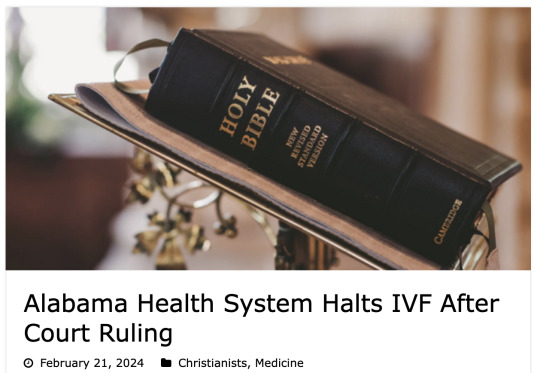

The company you keep is sometimes telling:
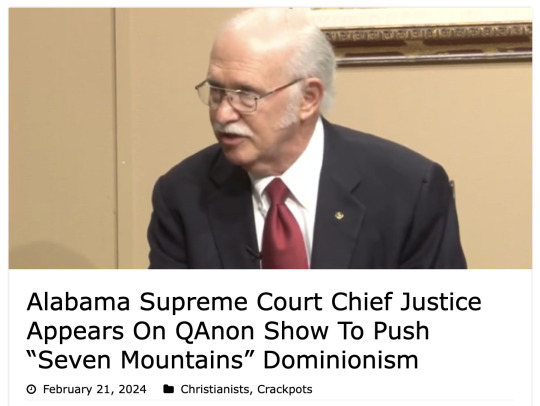

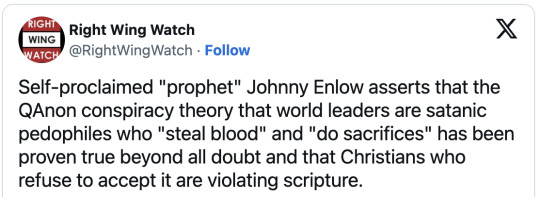
All you have to do is pick up a copy of Foreign Affairs or Le Monde Diplomatique. It's all right there in the open. We're all sleepwalking into a Luciferian future. Maybe it's for the best.

When I think of what omniscience would look like, this is exactly what comes to mind.

Impeccable logic.

...
There's a silver lining. His daughter turned out to be an outspoken atheist:
eve_wasframed (instagram)
#alabama#johnny enlow#christian nationalism#conservative christianity#conservatives in the news#tom parker#ivf#reproductive freedom
5 notes
·
View notes
Text
Got suggested this by Youtube:
youtube
It's a pretty good debunking of all the ~Nostradamus~ crank out there. Ole Michel doesn't have the profile now that he did in the 80s and 90s(when evangelicals could still delude themselves about the end of the 20th century bringing The End Times and confirming their faux-literalism), but I still enjoyed this breakdown of how useless his "Prophecies" are, and I figured I'd share it.
#Sean Munger#Video#History#Michel de Nostradame#Debunking#Woo#Crank#Conspiracism#Conservative Christianity#Apocalypticism#informative reblogs#Youtube
6 notes
·
View notes
Text
TheDeconstrussy does it again with his brilliant humorous way of pointing out the hypocrisy and the self-victim mentality of the right wing 👏
#thedeconstrussy#conservative christianity#right wing#pronouns are scary#war on christmas#including other holidays in everyday speech isnt a war declaration susan#homophobia#pride
4 notes
·
View notes
Note
Do you have any sources on ufology being constructed around conservative christian beliefs, or could you expand on that? I mainly ask because based on what I have read it seems mostly connected to the theory that says " gods were aliens and we worshipped them as gods and they helped the human race to evolve. Without them humanity would have remained stuck in an animal like state " ( which is problematic in a lot of ways)
I remember there was a Christian writing ( book of ennoch if I'm not wrong ) which people considered to be about alien experiments and abductions, but besides that I never made a link between christianity , ufos and aliens.
You might check out the #new age to alt right pipeline tag, where I've been writing about this kind of thing for awhile. If there are other people addressing this specific issue right now, I don't know about them.
Ufology is deeply tied in with conservative Christian conspiracy theories and apocalypticism. The alleged behavior of aliens is frequently very similar to alleged behaviors of demons during Europe's witch trials, if the aliens aren't just said to be demons altogether.
For those who reckon at least some alien beings as positive beings, they functionally take the role of angels. Furthermore, they are frequently imagined in a very militaristic, authoritarian light. One popular figure is Commander Ashtar, who is supposed to be a Pleiadian military commander stationed here to protect Earth from bad aliens. The Pleiadians, also called the "Nordics," are basically just Aryans In Space. Their primary enemies, the reptilians, are at best demonic figures; at worst they are worked into antisemitic conspiracy theories, and it's often outright claimed that Jewish people are more susceptible to reptilian influence.
These people also tend to believe in an imminent apocalypse. Exactly what that will entail depends on who you ask, but they'll pretty much all cite the New Testament as authority sooner or later. They believe that the good and the wicked (or the "high vibrational" and the "low vibrational") will be separated one way or another, because conservatives tend to think in terms of "in-group good, out-group bad."
To be sure, many of these people have some pretty unorthodox views of who Jesus was and what he set out to do, but they nonetheless center Jesus as a cosmically important figure. They pillage other people's sacred traditions for anything they think will support the beliefs they already have; they do not make any effort to understand these traditions on their own terms because they fundamentally do not care about anyone else's opinions or perceptions. They are "racially tolerant" only insofar as POC can be converted to their beliefs. They demonize nonbelievers and play the victim when they aren't taken seriously just like any other conservative Christian. They do not care about actual facts and evidence; they trust in truthiness.
I hope this helps clear things up!
#ufology#christianity#conservative christianity#aliens#extraterrestrials#new age#new agers#antisemitism#white supremacy#conspiracy theorists#conspiracism#answered
15 notes
·
View notes
Text
More pregnant minors forced to leave Ohio to prevent giving birth to their rapists' babies: affidavits
At least two more minors made pregnant by sexual assault were forced to leave Ohio to avoid having their rapists’ babies, according to sworn affidavits filed by abortion providers.
*****
The descriptions include those of three women who threatened suicide. They also include two women with cancer who couldn’t terminate their pregnancies and also couldn’t get cancer treatment while they were pregnant.
Another three examples were of women whose fetuses had severe abnormalities or other conditions that made a successful pregnancy impossible. Even so, they couldn’t get abortions in Ohio.
More needless pain and suffering for "pro-life" supporters to be proud of. But hey, headless fetuses have rights too!
#politics#us politics#republicans#republican hypocrisy#republican#republican family values#abortion#abortion history#abortion resources#abortion rights#rape#suicide tw#health care#reproductive freedom#reproductive justice#reproductive health#reproductive rights#reproductive choice#reproductive services#conservative christianity#pro life#conservatives#conservative#evangelical christianity#evangelical#pro chocie#pro children
16 notes
·
View notes
Text
Please think about this when you are an (evangelical) fundamentalist Christian:
When you say that Catholicism and Orthodoxy is from the devil and that there is the antichrist... Who do they worship? I mean, really...? When you say they worship the devil there, why do they pray to God, why do they believe in the Trinity of God? Do you want to say that God is the devil? I doubt it. So I remind you to be careful who you call the antichrist and the devil. You could falsely claim God to be the devil...
#religion#exvangelical#ex evangelical#ex fundamentalist#evangelical#evangelicalism#evangelical christianity#religious fundamentalism#fundamentalist christianity#conservative christianity#christianity#god#jesus
16 notes
·
View notes
Text

daily reminder ✨🙏
#affirmations#fundie snark#ex fundie#tradfem#biblical women#conservative christianity#lgbtq#fuck christianity#politics#united states of america#abortion#transrightarehumanrights#feminism#aesthetic#dark acadamia aesthetic
21 notes
·
View notes
Text
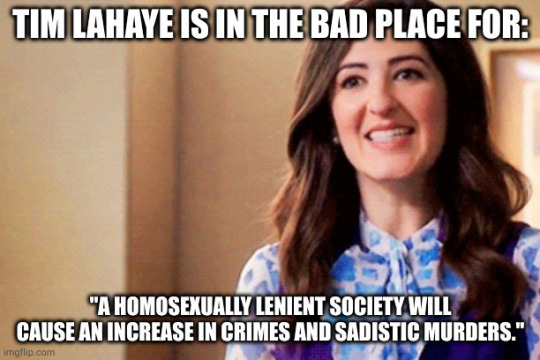

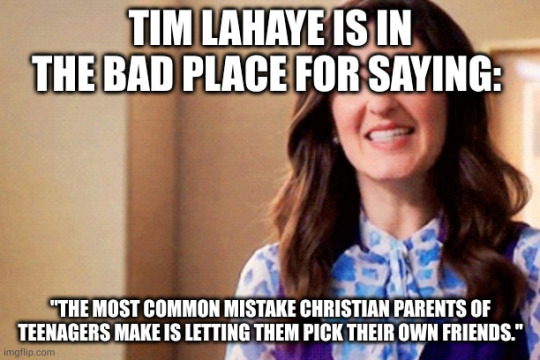

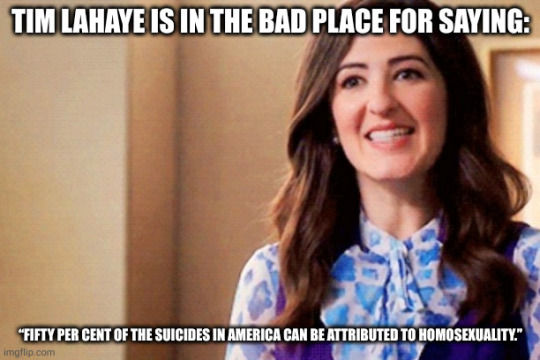

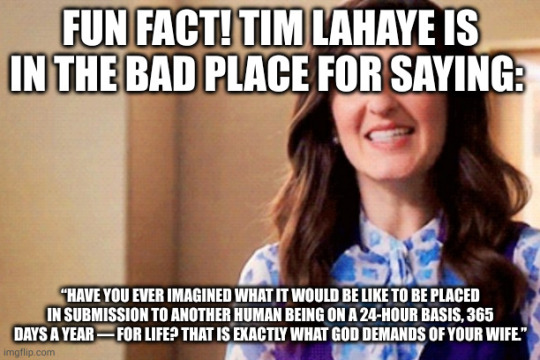
#ex religious#exchristian#ex christian#exorcism#ex christianity#ex evangelical#ex baptist#ex fundamentalists#ex fundie#ex fundamentalist#tim lahaye#christians#christian politics#alt right#religious right#conservative christians#Conservative Christianity#san diego christian college#christian college#anti religion#religious trauma#religious#religious homeschooling
6 notes
·
View notes
Text
Leaving Fundamentalism...
...was hard for me. From birth, I was raised in a radically conservative family of Christians. But even at a young age, I didn’t feel connected to the beliefs I was spoon fed in every aspect of my life.
I was made to feel guilty for not having blind faith. I was made to feel like I was a horrible person when doctrine was explained and it still didn’t make sense. I was made to feel shame for faking ‘my beliefs’. All for the sake of obeying my parents and being accepted by the only community I was allowed to be in.
But finally, after years of pressure and self doubt, I’m finally free.
There are still things I’m working on. I still am triggered and feel sick at the thought of entering a church or when I hear Christian music. I’m still trying to push aside the anti lgbtq+ thoughts I get automatically, even though I know the only reason I was against them was because I was told I was supposed to be - and without that harmful religion dictating my thoughts, there’s no reason why I should be against them.
And while I still have a ways to go towards a life where the trauma doesn’t affect me all the time, I can see the progress I’ve made already.
When I hear someone - like my family or random person - talk about Christianity, I now feel the same level of indifference towards it that I feel towards other religions with flawed beliefs/doctrine.
Yes, every now and then I still have that sense of dread that if I don’t believe in Christ that I’m going to suffer in hell for all eternity (such a wholesome thought that stems from a religion that says its based on universal love), but for the most part, now I can remember all those Bible stories and treat them the same as Greek myths. I can respect that someone’s Christian beliefs gives them comfort, but I don’t have to agree with them to be in a relationship with them.
Finally, I’m free to be on the outside and look in with indifference.
#religious trauma#former fundamentalist#religion free#former christian#conservative christianity#former evangelical#evangelical escapee#ex fundamentalist#ex christian
8 notes
·
View notes
Text
This is a sermon given in 1741 which apparently was deliberately intended and responsible for accelerating the Great Awakening in the New England area. It is the purest form of over-the-top fire-and-brimstone, fear-based and terror-mongering preaching I ever thought imaginable (and the link and following passage should be content-warned as such), to the point of saying the following (most of the way through, right before reaching the first signs of hopeful light at the end):
There is Reason to think, that there are many in this Congregation now hearing this Discourse, that will actually be the Subjects of this very Misery to all Eternity. We know not who they are, or in what Seat they sit, or what Thoughts they now have: it may be they are now at Ease, and hear all these Things without much Disturbance, and are now flattering themselves that they are not the Persons, promising themselves that they shall escape. If we knew that there was one Person, and but one, in the whole Congregation that was to be the Subject of this Misery, what an awful Thing would it be to think of! If we knew who it was, what an awful Sight would it be to see such a Person! How might all the rest of the Congregation lift up a lamentable and bitter Cry over him! But alas! instead of one, how many is it likely will remember this Discourse in Hell? And it would be a Wonder if some that are now present, should not be in Hell in a very short Time, before this Year is out. And it would be no Wonder if some Person that now sits here in some Seat at this Meeting-House in Health, and quiet & secure, should be there before to morrow Morning. Those of you that finally continue in a natural Condition, that shall keep out of Hell longest, will be there in a little Time! your Damnation don’t slumber; it will come swiftly, and in all probability very suddenly upon many of you. You have Reason to wonder, that you are not already in Hell.
A few notes of observation about the 18th-century English used:
As far as I can tell, absolutely all nouns are capitalized as in German, rather than contemporary practices of capitalizing some nouns that appear to me to be less consistent.
There are many contractions used, including our familiar can't, also 'tis (which I don't think was surpassed in popularity by it's until sometime a century later), but also han't instead of haven't, while 'em for them is also used liberally.
The most puzzling convention to me is that don't is used multiple times (including in the above passage) as a 3p singular form instead of doesn't.
10 notes
·
View notes
Text
Not that long ago, most Republicans were content to declare the U.S. as a nation founded on Judeo-Christian values. Then the Judeo somehow got lost along the way, as the party became more comfortable with anti-Semitism in its ranks. Now the party is moving toward a full-on embrace of theocracy, with candidates like Pennsylvania gubernatorial nominee Doug Mastriano (R) and Rep. Marjorie Taylor Greene (R-GA) proudly calling themselves Christian nationalists.
In that belief, Mastriano and Greene apparently have the support of the majority of the rank and file. A new University of Maryland Critical Issues Poll finds that 61% of Republicans would happily declare the U.S. a Christian nation, even though nearly as many recognize that such a move would violate the U.S. Constitution.
The support breaks along predictable lines. The older the Republican, the more likely the support. More than 70% of the Silent Generation and Boomers would declare the U.S. a Christian nation. That dwindles to just over half of Gen Z Republicans.
There are even Democrats who believe in calling the U.S. a Christian nation: a paltry 17%. Whether they believe in the same principle of nationalism that animates the GOP or just think it sounds nice is unclear.
The Republicans’ affinity for Christian nationalism is tightly related to white grievance politics. The poll surveyed more than 2,000 people. Of those, whites who believe white people faced more discrimination are more likely to call for a Christian America. Nearly 60% of those surveyed who said white people have been discriminated against a lot more than other groups in the past five years want to call the U.S. a Christian nation. Only 38% of those who don’t believe that agree.
The poll also underscores a new reality. Christian nationalism is more about politics than religion.
The fact of the matter is that there are far more people identifying themselves as evangelicals than people who actually practice their faith. About two-thirds of Protestant Republicans who attend church only once a year identify as evangelicals. Theology actually has almost nothing to do with a lot of evangelical belief. Evangelicals aren’t going to battle over questions of transubstantiation. It’s about culture war and politics.
In that sense, Christian nationalism is the perfect vehicle for the would-be authoritarians in the GOP. It cloaks the thirst for naked power in a crucifix. For years, the right has insisted that the separation of Church and State was a lie promulgated by godless leftists. (It was a belief expressed by Thomas Jefferson, whose opinion the right has spent years trying to explain away.) It created a fiction that the Founders were divinely inspired believers but many were more informed by the Enlightenment than by Christianity.
The myth is an important part of how people justify the politics. It’s the backdrop that gives them permission for their actions. If the U.S. is a Christian nation, then defending it from those you consider non-Christian forces – like LGBTQ people – is entirely permissible, even if those people are themselves people of faith.
Needless to say, the new poll gladdens the hearts of extremists.
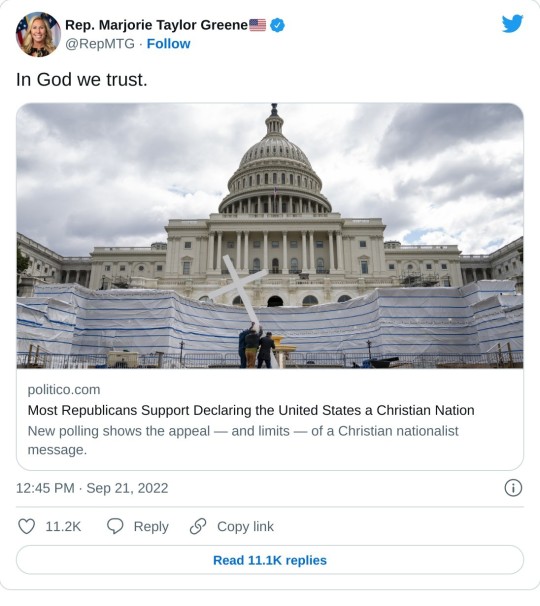
But let’s not get confused. The urge to call the U.S. a Christian nation has nothing to do with Christianity. It has everything to do with feeling threatened by a changing society and an unwillingness to be accommodate those changes.
Instead of trying to show the rest of the country why their beliefs are worth following by example, Christian nationalists simply want to impose them on everyone else. For them the Golden Rule is only three words long: Do unto others.
#us politics#news#lgbtq nation#lgbtqia+#2022#op eds#Republicans#conservatives#gop#christian nationalists#conservative christianity#american christianity#evangelical christianity#radical christianity#nationalism#white nationalism#University of Maryland#Critical Issues Poll#us constitution#separation of church and state#polls#white grievance politics#evangelicals#organized religion#the founding fathers#doug mastriano#rep. marjorie taylor greene
21 notes
·
View notes
Photo

https://twitter.com/americansunited/status/1651680020585148426
#americans united for the separation of church and state#americans united#church/state separation#secularism#andrew seidel#christian nationalism#conservative christianity
3 notes
·
View notes